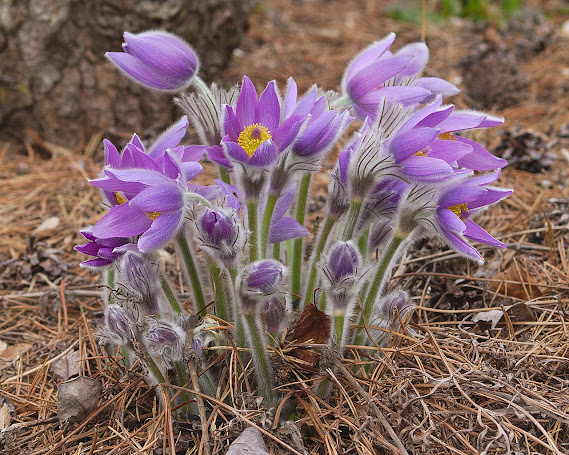Introduction
The Pasque flower, also known by its Latin name Pulsatilla, is one of the most beautiful and captivating wildflowers. With its delicate petals and striking colors, this flower often becomes a highlight in gardens and in the wild. While its beauty is mesmerizing, there are many other fascinating aspects about the Pasque flower, including its health benefits and its diverse varieties.
Understanding the Pasque Flower
The Pasque flower belongs to the Ranunculaceae family, which also includes many other flowers like buttercups and clematis. The name "Pasque" is derived from the French word "Pâques," meaning Easter, because this flower typically blooms around the Easter period.
Habitat and Distribution
Pasque flowers are typically found in open grasslands, hillside slopes, and open forests. They prefer well-drained soil and locations that receive full sunlight. In the wild, these flowers can be found in various parts of the world including Europe, North America, and some parts of Asia.
Characteristics
The Pasque flower is characterized by its soft, hairy petals and its blooms that range in color from purple, blue, red, to white. The flowers are bell-shaped and usually bloom in early spring. Its leaves are also hairy and have an interesting shape, adding to the visual appeal of the flower.
Health Benefits of the Pasque Flower
1. Traditional Use
Traditionally, the Pasque flower has been used in herbal medicine for various purposes. In European traditional medicine, Pulsatilla vulgaris has often been used to address respiratory issues, headaches, and sleep disorders. Extracts from this flower are believed to have mild analgesic and sedative properties.
2. Homeopathic Medicine
In homeopathy, Pulsatilla is used to treat a variety of conditions including digestive issues, menstrual disorders, and emotional problems like anxiety and depression. Homeopathic remedies made from the Pasque flower are typically used in very small, diluted doses.
3. Anti-inflammatory and Analgesic Properties
Modern research has shown that the Pasque flower possesses anti-inflammatory and analgesic properties. Active compounds in this flower can help reduce inflammation and pain, making it a natural option for managing conditions such as arthritis and muscle pain.
4. Sedative Effects
The Pasque flower is also known to have mild sedative effects. This can help with sleep problems and mild anxiety. Tea made from Pasque flowers is sometimes used as a natural sleep aid.
Varieties of Pasque Flowers
1. Pulsatilla vulgaris
Pulsatilla vulgaris, also known as the Pasque Flower or Easter Flower, is the most commonly found variety in Europe. Its flowers are purple or blue and bloom in early spring. This variety is the most frequently used in traditional and homeopathic medicine.
2. Pulsatilla patens
Pulsatilla patens, or the Prairie Pasque Flower, is a variety commonly found in North America. Its flowers are light blue or purple and often found in grasslands and high plains. This variety also has medicinal properties similar to Pulsatilla vulgaris.
3. Pulsatilla alpina
Pulsatilla alpina, or the Alpine Pasque Flower, grows in the mountainous regions of central and southern Europe. This flower has a wider range of colors including white, yellow, and purple. They grow in sandy and rocky soils at higher elevations.
4. Pulsatilla koreana
Pulsatilla koreana is a variety of the Pasque flower found in Korea and some parts of China. Its flowers range from dark purple to burgundy, and they bloom slightly later than other varieties. This variety is often used in traditional Asian medicine.
Growing and Caring for Pasque Flowers
Growing Pasque flowers can be a rewarding experience, especially if you are interested in beautiful and resilient wildflowers. Here are some tips for growing and caring for Pasque flowers in your garden:
Choosing a Location
Choose a location that receives full or partial sunlight. Ensure the soil has good drainage, as Pasque flowers do not like overly wet or waterlogged soil.
Planting
Pasque flowers can be grown from seeds or seedlings. If planting from seeds, sow them in early spring or late fall. The seeds require cold stratification, so sowing them outdoors during the winter can help.
Maintenance
Pasque flowers require minimal maintenance once established. Water them regularly, but avoid letting the soil become too moist. Fertilize with compost or organic fertilizer each spring to encourage healthy growth.
Pest and Disease Control
Pasque flowers are relatively resistant to pests and diseases. However, be on the lookout for slugs and snails that can damage the leaves. Use natural pest control methods or eco-friendly products if necessary.
Conclusion
The Pasque flower is one of the most captivating and versatile wildflowers. With its mesmerizing beauty and various health benefits, this flower deserves a place in every garden or home apothecary. While they require proper care and attention, the beauty and benefits offered by Pasque flowers make every effort worthwhile.
Among the different varieties of Pasque flowers available, each offers its own charm and medicinal properties. Whether you are interested in adding natural beauty to your garden or seeking natural solutions for various health issues, the Pasque flower is a worthy consideration. Always remember to use this flower wisely and consult with health professionals before using it for medicinal purposes.
References :
https://www.ohmyflower.com/2024/06/blog-post.html
https://www.idntimes.com/science/discovery/fatma-roisatin-nadhiroh/bunga-pegunungan-alpen-c1c2
https://blog.eigeradventure.com/bunga-di-gunung/
https://en.wikipedia.org/wiki/Pulsatilla_vulgaris
https://facts.net/earth-and-life-science/nature-earth-and-life-science/19-pasque-flower-facts/
https://www.indefenseofplants.com/blog/tag/Pasqueflower
https://www.gardenia.net/plant/pulsatilla-vulgaris-pasque-flower
https://plantsinthecity.ca/products/pulsatilla-vulgaris






.jpg)



No comments:
Post a Comment